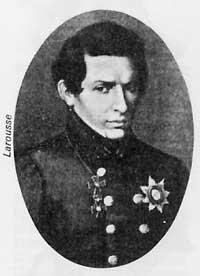Nikolai Ivanovitx Lobatxevski
The Russian mathematician joined the world of Nijni Novgorod (today Gorky) in 1792. Although another date of birth has also been mentioned, the investigations of Russian historians give it as true.
As a five-year-old boy, his father left his family and his mother returned to his grandparents' home with his children. He studied at the Kazan Lyceum and entered the Kazan-gop University founded in 1807 two years earlier. In 1811 he finished his studies obtaining the title of Magister and there he was proposed to stay.
It was very fast and published many works. In any case, there is no doubt that Lobatxevski's fame earned her as a heresy of mathematics. Until then, Euklides' mathematics seemed intangible and all mathematicians accepted it unanimously. Lovatxevski was the first to rise up against this implicit agreement. He questioned the postulates mentioned in the book Elements of Euclid, which was considered heresy for a long time.

He took the first steps of Lobatxevski to demonstrate the postulate of the parallels and thought he got it. Lobatxevski claimed that Euklides' fifth postulate was demonstrated by experience and that there is no evidence outside it. In other words, he pointed out that the fifth postulate is not a consequence of the first four postulates.
Lobatxevski postulated the substitute postulate of Euklides: “From any point outside a line, two points parallel to that line can be made. Because surfaces and lines are not in Nature, but in imagination.” At first he literally named Imaginary Geometry and later Pangeometry. Today it is called Hyperbolic Geometry and sometimes Geometry of Lobatxevski in honor of its inventor. Lobatxevski also built the Trigonometry corresponding to this geometry. That is also rare, but they support each other, that is, if one is possible, the other also.
In 1826 he first spoke to the public about his new ideas and published them in 1829 in the Kazan Bulletin. In 1837 he published his theories in the famous Journal de Crelle under the title of Imaginary Geometry and in 1840 he wrote a monograph in German (Geometric Studies on the Theory of Parallels). All these works were rounded up in 1856 with the title of Pangeometry by publishing a complete explanation of their theories.
Lobatxevski studied at the University and held positions of responsibility in 1816, was appointed Special Professor and in 1820 was appointed Dean of the Faculty of Physics and Mathematics for the first time. In 1822 he was a professor. He was director of the library and rector of the University between 1827 and 1846.
In 1842 he was appointed member of the Society of Sciences of Gottingen. In 1846 he was informed that, after 30 years of his first appointment as a professor, he had to retire legally. As until then he was only 53 years old, they tried to obtain the exemption, but it was not possible and he was appointed Delegate of the Secretariat of the Academic District of Kazan. Lobatxevski considered this position totally bureaucratic and insignificant and abandoned it in 1853.
Brilliant mathematician who shook Mathematics and Geometries died in Kazan in 1856.





